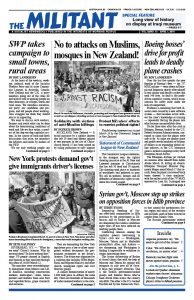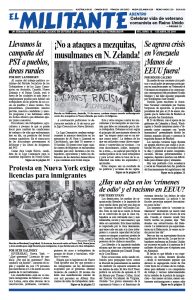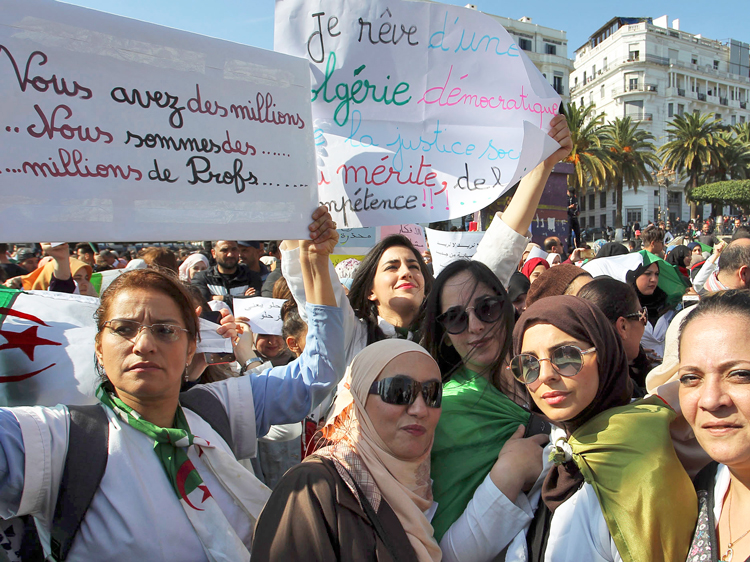The movement in Algeria demanding the immediate resignation of ailing President Abdelaziz Bouteflika continues to pick up steam. Working people view his March 11 announcement that he would not run in upcoming elections, coupled with postponing elections until after the writing of a new constitution, as a subterfuge.
The announcement was answered by hundreds of thousands of people who flooded the streets of Algiers March 15. This was the biggest action yet since protests broke out across the country after Bouteflika said in February that he planned to run for a fifth term in the April 18 elections. A general strike March 11 included public-sector unions and shopkeepers.
“No to the violation of the constitution,” “System, get out. The people have arrived,” “You prolong your term, we prolong our combat,” were among the signs carried at the March 15 protest.
Another sign said, “Not Washington or Paris. Only we ourselves will elect the president,” directed at imperialist intervention in Algeria. Protesters were incensed at the tweet by French President Emmanuel Macron that Bouteflika’s announcement “has opened a new page in Algerian democracy.”
Bourgeois opposition parties have played little role in the actions, which tens of thousands of young people have helped lead. Half of the population of Algeria is under 30 years old and over a quarter of those are unemployed.
Protesters chanted, “We wanted elections without Bouteflika, we were given Bouteflika without elections,” reported BBC News.
Bouteflika, 82, has been president of this former French colony since 1999 and played a key role in negotiating an end that year to a bloody 10-year conflict with armed Islamist groups. He was paralyzed from a stroke in 2013 and has not addressed the country since then and rarely appears in public. The government is run by the army, his supporters in the National Liberation Front party, his brother Said, and capitalists who have lucrative state contracts.
In 1962 working people made a revolution, overthrowing French colonial rule in Algeria. A workers and farmers government came to power headed by Ahmed Ben Bella. But three years later it was overthrown in a coup organized by Minister of Defense Col. Houari Boumedienne, who was supported by then Foreign Minister Bouteflika. The gains of the revolution were reversed.
Ben Bella was thrown in prison for 15 years, then exiled for another decade. The revolutionary government of Cuba had supported the Algerian Revolution with economic and military aid, doctors and other health workers, and helped defend Algeria against provocations from neighboring Morocco in 1963.
In a June 27, 1965, speech, Cuban revolutionary leader Fidel Castro denounced the coup, which was carried under the banner of “defending” the revolution. “Those who disregard the force of the masses and who may try to replace them with the force of the barracks, behind the people’s back” can never be revolutionary, Castro said.
Export of oil and gas accounts today for 95 percent of the country’s foreign earnings. The government had used some of the energy profits to fund welfare programs aimed at keeping workers and farmers from rising up.
But since 2014 when crude oil prices plummeted to $50 a barrel welfare programs have been slashed and inflation has risen. Economic growth fell to 2.3 percent in 2018 from 3.8 in 2014. The oil industry has been rife with corruption and oil bosses are “watching with concern to see if strikes that have hit other industries spread to Algeria’s energy industry,” said the Washington Post.
In France, which has the largest population of Algerians outside the country, some 10,000 people protested at Republic Square in Paris March 3. Six thousand demonstrated in Marseille, and there was another rally in Bordeaux.
Several thousand Algerians rallied in front of the Algerian Consulate in Montreal March 17. This was the fourth protest there in as many weeks in solidarity with the actions in Algeria.
“We are against the rule of Bouteflika and the regime,” Mustafa Deba, a mechanic, told the Militant there. “We are for a regime chosen by the people.”
Joe Young contributed to this article from Montreal.


